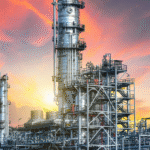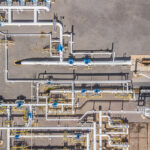The Critical Role of Refineries in Our Daily Lives
The world’s refineries process tens of millions of barrels of oil daily, converting crude oil and, in some cases, much smaller volumes of bio-feedstocks into the fuels that power our cars, trucks, ships, and planes. Beyond transportation fuels, these complex facilities produce the feedstocks for thousands of everyday products we all depend on – from plastics and synthetic materials to pharmaceuticals and cosmetics.
As project managers working on midstream projects, you understand that even minor disruptions to refinery operations can have cascading effects throughout the entire supply chain. The challenge isn’t just building these facilities – it’s ensuring they can operate with maximum efficiency and minimal downtime for decades to come.
The High Cost of Operational Disruptions
Unplanned shutdowns don’t just affect production schedules; they impact entire regional economies. When a major refinery goes offline, fuel prices can spike, supply chains get disrupted, and the financial losses can reach millions of dollars per day. For CMs, this reality underscores the critical importance of building robust, maintainable systems from the ground up.
The most successful midstream projects are those that prioritize long-term operational reliability over short-term cost savings. This means incorporating redundancies, selecting materials that can withstand harsh processing environments, and designing systems that facilitate efficient maintenance and inspection.
Getting Ahead of Problems: The Proactive Approach
Current refinery management has shifted from reactive maintenance to predictive analytics. CMs can support this transition by building infrastructure that enables comprehensive monitoring and data collection. When planning midstream energy projects, consider how vulnerability studies and root cause analyses can be integrated into the design phase.
These proactive tools help identify potential issues before they escalate into costly shutdowns. By understanding failure modes during construction, teams can implement design modifications that address vulnerabilities before they become operational nightmares.
The key is building systems that provide operators with the tools they need to get in front of problems instead of constantly chasing them. This means incorporating sensor networks, monitoring systems, and data collection points that weren’t standard in previous generations of refinery construction.
The Digital Transformation of Refinery Operations
The most significant change in refinery operations over the past decade has been the shift from paper-based systems to digital tools. CMs play a crucial role in enabling this transformation by designing facilities that support digital workflows from day one.
Replacing clipboards with tablets might seem like a simple upgrade, but it represents a fundamental shift in how data is collected, analyzed, and acted upon. When refinery maintenance goes digital, operators can spot patterns that would be invisible in paper-based systems, respond faster to developing issues, and make better decisions based on comprehensive data analysis.
For CMs, this means thinking beyond traditional infrastructure to include robust IT networks, secure data storage systems, and user-friendly interfaces that maintenance teams can access in challenging industrial environments. The goal is to create facilities where digital tools enhance rather than complicate daily operations.
Building for Long-Term Performance
Reducing operational disruptions and improving long-term performance requires a holistic approach that begins during the construction phase. This means selecting equipment and materials that can withstand the corrosive environments typical in refinery operations, designing systems with built-in redundancies, and creating layouts that facilitate efficient maintenance access.
Consider how every design decision impacts future operations. Will maintenance teams be able to access critical components safely and efficiently? Are there backup systems in place for essential processes? Can the facility adapt to changing operational requirements or new regulations?
The most successful refinery projects balance initial construction costs with lifecycle operational expenses. Sometimes spending more upfront on higher-quality materials or more sophisticated monitoring systems pays dividends through reduced maintenance costs and improved uptime over the facility’s operational life.

Enabling Smarter Decision Making
Modern refineries generate enormous amounts of data from sensors, monitoring systems, and operational equipment. CMs can enable smarter decision-making by building the infrastructure necessary to collect, transmit, and analyze this information effectively.
This includes designing control rooms that can accommodate advanced monitoring systems, installing fiber optic networks that can handle large data volumes, and creating secure environments for data storage and processing. The goal is to give operators the information they need to make informed decisions quickly.
When maintenance teams can access real-time data about equipment performance, they can schedule interventions during planned downtime rather than responding to unexpected failures. This shift from reactive to predictive maintenance is only possible when the underlying infrastructure supports comprehensive data collection and analysis.
The Path Forward
The future of refinery operations lies in the integration of robust physical infrastructure with sophisticated digital monitoring and control systems. CMs working on midstream projects can build facilities that set new standards for operational excellence.
This means thinking beyond traditional construction deliverables to consider how each system will be operated, maintained, and upgraded over time. It requires close collaboration with operating teams to understand their needs and challenges, and it demands a commitment to building facilities that can adapt to changing requirements.
KBCm’s success in midstream construction isn’t just about delivering projects on time and budget – it’s about creating infrastructure that enables decades of safe, efficient, and profitable operations. Contact Michael Green at (361) 703-9671 for more information.




